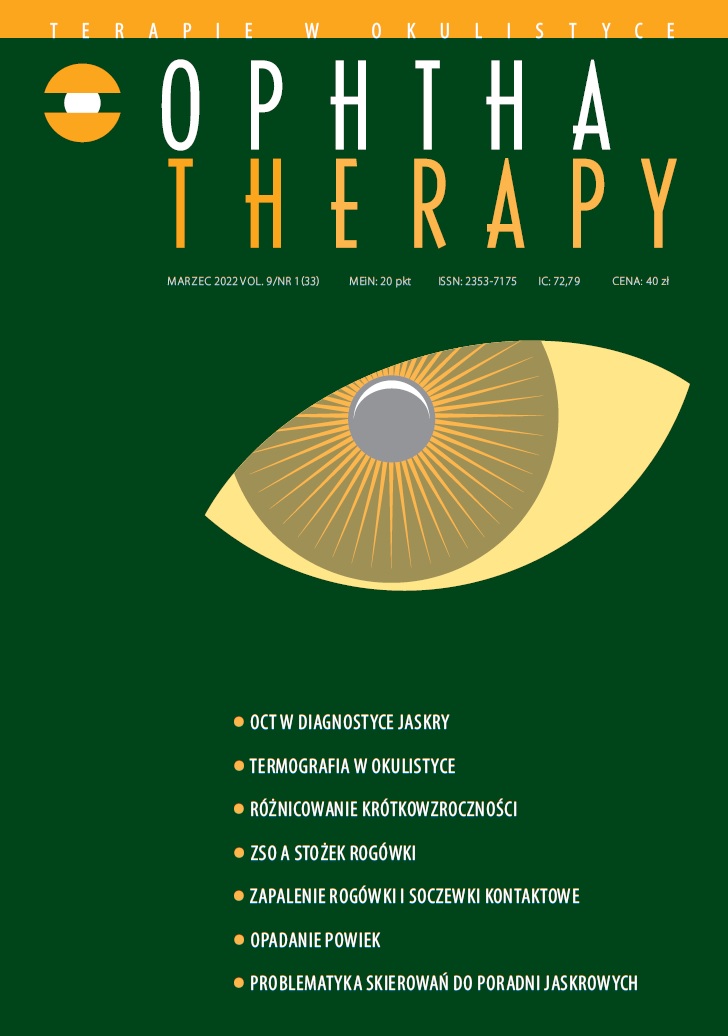Dry eye syndrome triggered by wearing gas permable contact lens in keratoconus Case report
Main Article Content
Abstract
A 48-year-old woman suffering from keratoconus of both eyes sought medical attention at the ophthalmology clinic with her left eye having been painful for prior 3 weeks, as well as increased sensitivity to light, foreign body sensation, stinging and watering eye. Her left eye was diagnosed with the dry eye syndrome, in addition to being treated with gas permable contact lens. Physical examination revealed corneal punctate epithelial erosions that stained positively with fluorescein in the left eye. The patient was ultimately diagnosed with dry eye disease of the left eye caused by gas permable contact lens usage.
Downloads
Article Details

This work is licensed under a Creative Commons Attribution-NonCommercial-NoDerivatives 4.0 International License.
Copyright: © Medical Education sp. z o.o. License allowing third parties to copy and redistribute the material in any medium or format and to remix, transform, and build upon the material, provided the original work is properly cited and states its license.
Address reprint requests to: Medical Education, Marcin Kuźma (marcin.kuzma@mededu.pl)
References
2. Horwath-Winter J, Berghold A, Schmuy O et al. Evaluation of the Clinical Course of Dry Eye Syndrome. Arch Ophthalmol. 2003; 121: 1364-8.
3. Uchino M, Kawashima M, Uchino Y et al. Association between tear film break up time and blink interval in visual display terminal users. Int J Ophthalmol. 2018; 11(10): 1691-7.
4. McMonnies CW. Inflammation and Keratoconus. Optom Vis Sci. 2015; 92(2): e35-41.
5. Molina K, Graham AD, Yeh T et al. Not All Dry Eye in Contact Lens Wear Is Contact Lens-Induced. Eye Contact Lens. 2020; 46: 214-22.
6. Wang MTM, Craig JP. Natural history of dry eye disease: Perspectives from inter-ethnic comparison studies. Ocul Surf. 2019; 17(3): 424-33.
7. Carracedo G, Blanco MS, Martin-Gil A et al. Short-term Effect of Scleral Lens on the Dry Eye Biomarkers in Keratoconus. Optom Vis Sci. 2016; 93(2): 150-7.
8. Badugu R, Jeng BH, Reece EA et al. Contact Lens to Measure Individual Ion Concentrations in Tears and Applications to Dry Eye Disease. Anal Biochem. 2018; 542: 84-94.
9. Lidich N, Garti-Levt S, Aserin A et al. Potentiality of microemulsion systems in treatment of ophthalmic disorders: Keratoconus and dry eye syndrome – In vivo study. Colloids and Surfaces B: Biointerfaces. 2019; 173: 226-32.
10. Avunduk AM, Avunduk MC, Varnell ED et al. The Comparison of Efficacies of Topical Corticosteroids and Nonsteroidal Anti-inflammatory Drops on Dry Eye Patients: A Clinical and Immunocytochemical Study. Am J Ophthalmol. 2003; 136(4): 593-602.
11. Yamaguchi T. Inflammatory Response in Dry Eye. Invest Ophthalmol Vis Sci. 2018; 59(14): DES192-9.

